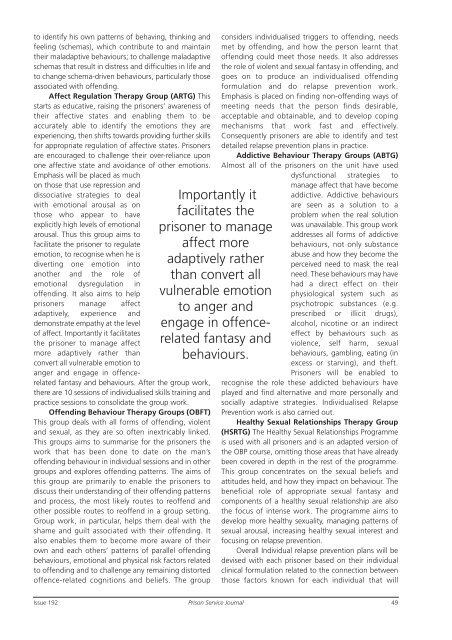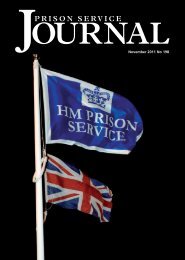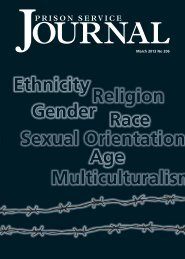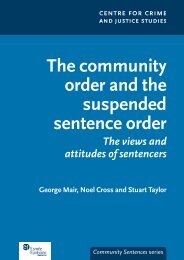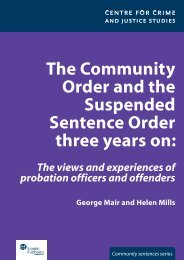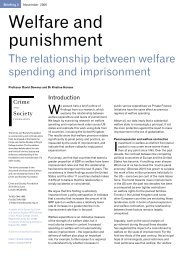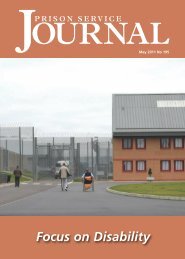PRISON SERVICE
PRISON SERVICE
PRISON SERVICE
- No tags were found...
You also want an ePaper? Increase the reach of your titles
YUMPU automatically turns print PDFs into web optimized ePapers that Google loves.
to identify his own patterns of behaving, thinking andfeeling (schemas), which contribute to and maintaintheir maladaptive behaviours; to challenge maladaptiveschemas that result in distress and difficulties in life andto change schema-driven behaviours, particularly thoseassociated with offending.Affect Regulation Therapy Group (ARTG) Thisstarts as educative, raising the prisoners’ awareness oftheir affective states and enabling them to beaccurately able to identify the emotions they areexperiencing, then shifts towards providing further skillsfor appropriate regulation of affective states. Prisonersare encouraged to challenge their over-reliance uponone affective state and avoidance of other emotions.Emphasis will be placed as muchon those that use repression anddissociative strategies to dealwith emotional arousal as onthose who appear to haveexplicitly high levels of emotionalarousal. Thus this group aims tofacilitate the prisoner to regulateemotion, to recognise when he isdiverting one emotion intoanother and the role ofemotional dysregulation inoffending. It also aims to helpprisoners manage affectadaptively, experience anddemonstrate empathy at the levelof affect. Importantly it facilitatesthe prisoner to manage affectmore adaptively rather thanconvert all vulnerable emotion toanger and engage in offencerelatedfantasy and behaviours. After the group work,there are 10 sessions of individualised skills training andpractice sessions to consolidate the group work.Offending Behaviour Therapy Groups (OBFT)This group deals with all forms of offending, violentand sexual, as they are so often inextricably linked.This groups aims to summarise for the prisoners thework that has been done to date on the man’soffending behaviour in individual sessions and in othergroups and explores offending patterns. The aims ofthis group are primarily to enable the prisoners todiscuss their understanding of their offending patternsand process, the most likely routes to reoffend andother possible routes to reoffend in a group setting.Group work, in particular, helps them deal with theshame and guilt associated with their offending. Italso enables them to become more aware of theirown and each others’ patterns of parallel offendingbehaviours, emotional and physical risk factors relatedto offending and to challenge any remaining distortedoffence-related cognitions and beliefs. The groupImportantly itfacilitates theprisoner to manageaffect moreadaptively ratherthan convert allvulnerable emotionto anger andengage in offencerelatedfantasy andbehaviours.considers individualised triggers to offending, needsmet by offending, and how the person learnt thatoffending could meet those needs. It also addressesthe role of violent and sexual fantasy in offending, andgoes on to produce an individualised offendingformulation and do relapse prevention work.Emphasis is placed on finding non-offending ways ofmeeting needs that the person finds desirable,acceptable and obtainable, and to develop copingmechanisms that work fast and effectively.Consequently prisoners are able to identify and testdetailed relapse prevention plans in practice.Addictive Behaviour Therapy Groups (ABTG)Almost all of the prisoners on the unit have useddysfunctional strategies tomanage affect that have becomeaddictive. Addictive behavioursare seen as a solution to aproblem when the real solutionwas unavailable. This group workaddresses all forms of addictivebehaviours, not only substanceabuse and how they become theperceived need to mask the realneed. These behaviours may havehad a direct effect on theirphysiological system such aspsychotropic substances (e.g.prescribed or illicit drugs),alcohol, nicotine or an indirecteffect by behaviours such asviolence, self harm, sexualbehaviours, gambling, eating (inexcess or starving), and theft.Prisoners will be enabled torecognise the role these addicted behaviours haveplayed and find alternative and more personally andsocially adaptive strategies. Individualised RelapsePrevention work is also carried out.Healthy Sexual Relationships Therapy Group(HSRTG) The Healthy Sexual Relationships Programmeis used with all prisoners and is an adapted version ofthe OBP course, omitting those areas that have alreadybeen covered in depth in the rest of the programme.This group concentrates on the sexual beliefs andattitudes held, and how they impact on behaviour. Thebeneficial role of appropriate sexual fantasy andcomponents of a healthy sexual relationship are alsothe focus of intense work. The programme aims todevelop more healthy sexuality, managing patterns ofsexual arousal, increasing healthy sexual interest andfocusing on relapse prevention.Overall Individual relapse prevention plans will bedevised with each prisoner based on their individualclinical formulation related to the connection betweenthose factors known for each individual that willIssue 192 Prison Service Journal49


